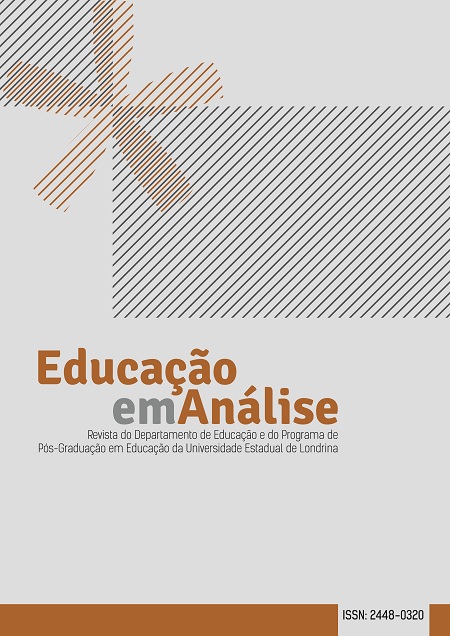Enunciative scenes in social networks: argumentative directions and implications for teaching
DOI:
https://doi.org/10.5433/1984-7939.2021v6n2p335Keywords:
Argumentation, Comments, Enunciative movementsAbstract
This paper aims to demonstrate the results of the enunciative analysis about the event National Program of Civic-Military Schools highlighted in the social network Facebook. Our approach points to arguments that corroborate (or not) fundamentals, values and actions defended in a vision in which enunciative movements, present in social networks, are highlighted, arising from: (i) disclosure of the National Program of Civic-Military Schools in which the installation of 216 new schools by 2023 is reported and(m) its repercussions; (ii) the comments to the post on the Facebook fanpage. Thus, the arguments and the way the school institution and enunciative choices such as discipline, order, quality and hierarchy guide the post and project meanings from the theme are taken. It was noticed the importance of addressing the discourses that permeate the current school and how readers need to manifest themselves with favorable and contrary arguments built from the post comments, indicating the values of a school and the ideal education (or not), according to the debate instaured on the subject, guiding possible actions for teachers before this debate.Downloads
References
BRASIL. Escola Cívico Militar. Brasília, 5 set. 2019. Facebook: @ministeriodaeducação. Disponível em: https://www.facebook.com/ministeriodaeducacao/photos/a.516922078355611/2429177957130004/?type=3&theater. Acesso em: 12 ago. 2020.
DALMASCHIO, Luciani; JAMAL, Angela; A semântica da enunciação e seus princípios fundantes. In: PENA, E. (org.). Enunciação e língua: uma introdução. Florianópolis: Beconn, 2014. p. 17-27.
DIAS, Luiz Francisco. Sentido e enunciação: a atualidade do conceito de acontecimento na semântica. Estudos da Língua(gem), Vitória da Conquista, n. 1, v. 13, p. 229-248, jun. 2015.
DUCROT, Oswald. Argumentação retórica e argumentação linguística. Letras de Hoje, Porto Alegre, n. 1, v. 44, p. 20-25, jan./mar. 2009.
DUCROT, Oswald; CAREL, Marion. La semántica argumentativa: una introducción a la teoría de los bloques semánticos. Buenos Aires: Colihue, 2006.
GUIMARÃES, Eduardo.Semântica do Acontecimento: um estudo enunciativo da designação. Campinas: Pontes.2002.
GUIMARÃES, Eduardo. Argumentatividade e argumentação. Revista do Programa de Pós-Graduação em Letras da Universidade de Passo Fundo, Passo Fundo, n. 2, v. 9, p. 271-283, 2013.
MARCUSCHI, Luiz Antônio. Produção textual, análise de gêneros e compreensão. São Paulo: Parábola, 2008.
ORLANDI, Eni Pulcinelli. A linguagem e seu funcionamento: as formas do discurso. Campinas: Pontes, 2001.
ORLANDI, Eni Pulcinelli. Análise do discurso: princípios e procedimentos. Campinas: Pontes, 2009.
ORLANDI, Eni Pulcinelli. Discurso e argumentação: um observatório do político. Fórum Linguístico, Florianópolis, n. 1, p. 73-81, 1998.
Downloads
Published
How to Cite
Issue
Section
License
Copyright (c) 2021 Educação em Análise

This work is licensed under a Creative Commons Attribution 4.0 International License.
Os artigos publicados na Revista Educação em Análise estão sob a Licença Creative Commons Atribuição 4.0 Internacional, garantindo Acesso Aberto. Deste modo, os autores mantêm os direitos autorais de seus trabalhos e, em caso de republicação, solicita-se que indiquem a primeira publicação nesta revista. Essa licença permite que qualquer pessoa leia, baixe, copie e compartilhe o conteúdo, desde que a devida citação seja feita. Além disso, autoriza a redistribuição, adaptação e criação de obras derivadas em qualquer formato ou meio, incluindo uso comercial, desde que a atribuição à revista seja mantida.
A revista se reserva o direito de efetuar, nos originais, alterações de ordem normativa, ortográfica e gramatical, com vistas a manter o padrão culto da língua e a credibilidade do veículo. Respeitará, no entanto, o estilo de escrever dos autores. Alterações, correções ou sugestões de ordem conceitual serão encaminhadas aos autores, quando necessário.
As opiniões emitidas pelos autores dos artigos são de sua exclusiva responsabilidade.
























